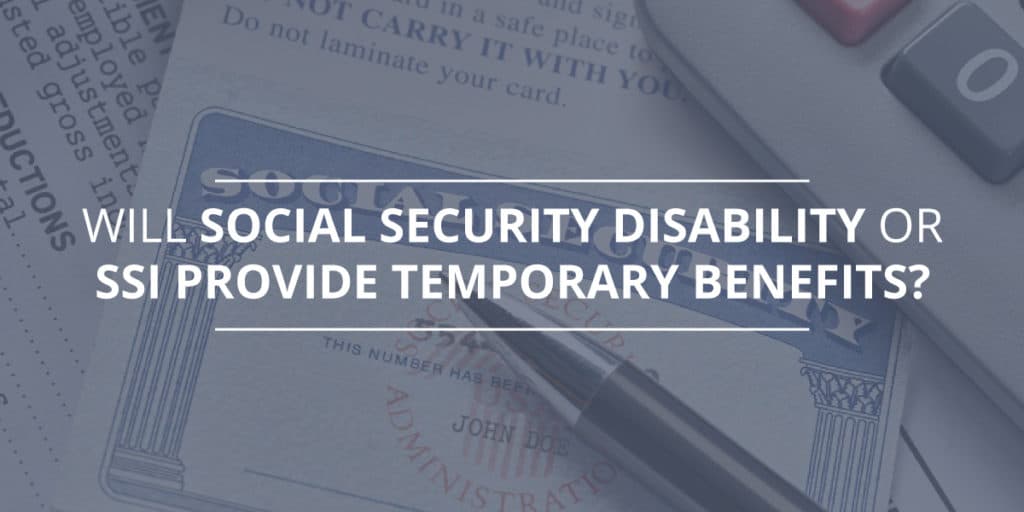
A short-term disability does not qualify as a disability for either SSDI or SSI benefits.
But you do have other options.
The Social Security Administration (SSA) has two disability programs that offer benefits to individuals with disabilities:
SSDI pays benefits to individuals with disabilities and certain members of their families if they have worked long enough and paid Social Security taxes. SSI pays benefits to those individuals who have both a disability and financial need.
Many Americans experience a health issue in their lifetime that prevents them from working and that causes financial distress. These medical or mental health problems may resolve over time, and may not require a person to stop working permanently. In these situations, you may wonder if SSDI or SSI will provide temporary benefits to cover this shorter period of time.
Both SSDI and SSI are designed to provide benefits to individuals whose medical impairments are permanent or long-term (expected to last 12 months or longer). However, there are ways that a person may be able to get benefits for a shorter period of time by returning to work when they are able to after becoming disabled.
Can I Get Temporary SSDI or SSI Benefits?

You cannot receive temporary SSDI or SSI benefits. The reason for this is simple: a short-term (temporary) disability doesn’t qualify as a disability for either SSDI or SSI benefits. Under the SSA’s definition of disability, you must meet three criteria:
- You cannot do the work that you did before (past relevant work);
- You cannot adjust to other work because of your medical condition(s); AND
- Your disability has lasted is expected to last for at least 12 months or to result in death.
In other words, if you have a short-term condition that will not last for 12 months or longer, then you will not qualify as disabled under SSA rules. This is true even if you cannot work due to your medical impairment.
Related Information: How Can I Prove to the SSA that I Can’t Do Sedentary Work?
Getting Benefits and Then Returning to Work
If you believe that you may be able to return to work at a later date, then you may be able to receive what are effectively temporary benefits if you are able to successfully able to return to work. This is done through a trial work period, which is a program offered by the SSA where disability recipients can return to work without putting their benefits at risk.

The SSA has strict rules about employment while receiving SSDI or SSI benefits. If you earn more than a specified amount of money from substantial gainful activity, then you will risk losing your benefits. For 2019, the monthly substantial gainful activity amount for blind individuals is $2040 (SSDI only) and $1220 for non-blind individuals (SSDI and SSI).
After a person becomes eligible for benefits, they may attempt to return to the work force in a trial work period where beneficiaries can work without jeopardizing their benefits. Under SSA rules, an individual can work for 9 months in a 60 month period. If an individual does not feel able to work, then they can stop and continue receiving benefits; however, if they have earned above the income limit for 10 months, the SSA may suspend their benefits.
Importantly, if you anticipate returning to work within 12 months at the time that you apply — and make this clear to SSA when you apply — it could weaken your claim and decrease the likelihood that you will receive benefits. A New Jersey disability benefits attorney can work with you to help make sure that your application does not raise red flags about a possible short-term disability.
Contact Us Today
To schedule a free claim review or to learn more about how we can help you, contact our office today at 856-795-8880.
Schedule A Free Claim Review
Can I Go Back on Disability If I Am Not Capable of Working?

If you go back to work after being on benefits and decide that you are unable to keep working due to your disability, you may qualify for expedited reinstatement. This SSA program is available to SSDI and SSI recipients who go off benefits but need to go back on benefits within 5 years.
To be eligible for expedited reinstatement, you must be an SSDI or SSI beneficiary who:
- Stopped receiving benefits because of earnings from work;
- Is currently unable to work or to perform the substantial gainful activity;
- Is disabled because of an impairment(s) that is the same as the impairment that qualified you for benefits previously;
- Made the request within 5 years from the months that your benefits ended.
If you qualify, then you will receive provisional benefits, which will only be paid for a period of 6 months. During this time, the SSA will review your updated medical information and determine if you qualify for long-term benefits. If you are deemed eligible, then your benefits will continue; otherwise, your benefits will terminate after 6 months.
Work with a New Jersey Disability Benefits Attorney
Although SSDI and SSI benefits are not available on a temporary basis, you may be able to receive them for a shorter period of time if you are able to return to work. Doing so through a trial work period allows you to test out working without putting your benefits at risk. An experienced New Jersey disability attorney can help you with your initial benefits application as well as any subsequent questions that may arise, including on trial work periods and expedited reinstatement.
At Bross & Frankel, we are dedicated to helping people with disabilities get the benefits that they need. We have substantial experience in the field of Social Security disability benefits and are skilled at all phases of the process. To schedule a free claim review or to learn more about how we can help you, contact our office today at 856-795-8880, or reach out to us online.
Related Informations:
- What is Social Security Continuing Disability Review
- Appealing Denied LTD Benefits
- Long Term Disability Benefits Denied or Terminated? How to Appeal

Rich Frankel is the managing partner of Bross & Frankel. He is a member of the New Jersey and Pennsylvania bars. He has focused exclusively on disability and social security benefits since 2005.
Mr. Frankel joined what is now Bross & Frankel after having watched his father struggle with disability, fighting a lengthy illness. Mr. Frankel founded the firm’s veteran’s law practice and substantially grew the social security disability practice, focusing Bross & Frankel’s ability to fight for all of the disability benefits available to his clients.
Mr. Frankel additionally fights for clients in court, obtaining frequent victories in Social Security appeals and against insurance companies in Federal court.